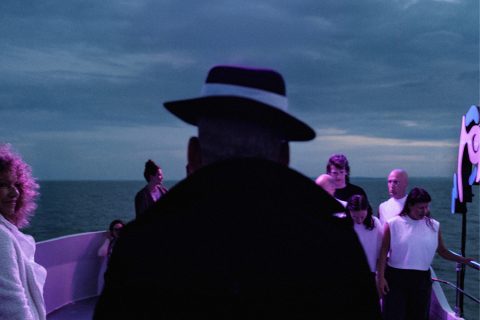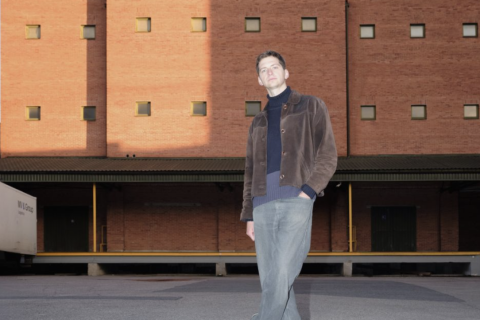“We are here together, we share this air and time together. I think this makes performing arts magical.” With this thought, we concluded a several-hour conversation with an artist duo from the Czech Republic. This year, Barbora Türkmen Šoganová (Slovakia/Czech Republic) and Orkun Türkmen (Turkey/Czech Republic) are participants in the “Creative Europe” platform project “Magic Carpets”, organized by the Kaunas Biennial.
These representatives of physical theater and contemporary clowning created and collaborated with the Dainava community during six meetings in late August and early September, attempting to understand where “The Power of Kindness” lies. This is the leading topic of this year’s creative workshops, during which the Dainava residents met and worked with artists from various fields.
We met for the conversation at the Kaunas Biennial office, the day after their 4th workshop with the community, which I also had the opportunity to attend. The cozy atmosphere of the “Būkime kartu” family center, friendly welcoming faces, and cups of tea in hand – all of this created a sense of safety and belonging even before the activity began. The evening’s participants slowly gathered, greeted each other familiarly, and drew me into conversations during which I learned more about the activities that had already taken place and got to know the residents of the Dainava district. We were about to start the workshop, but before that – we sang “Happy Birthday” in Lithuanian for Barbora and began to introduce ourselves while tasting the birthday cake prepared by Orkun.
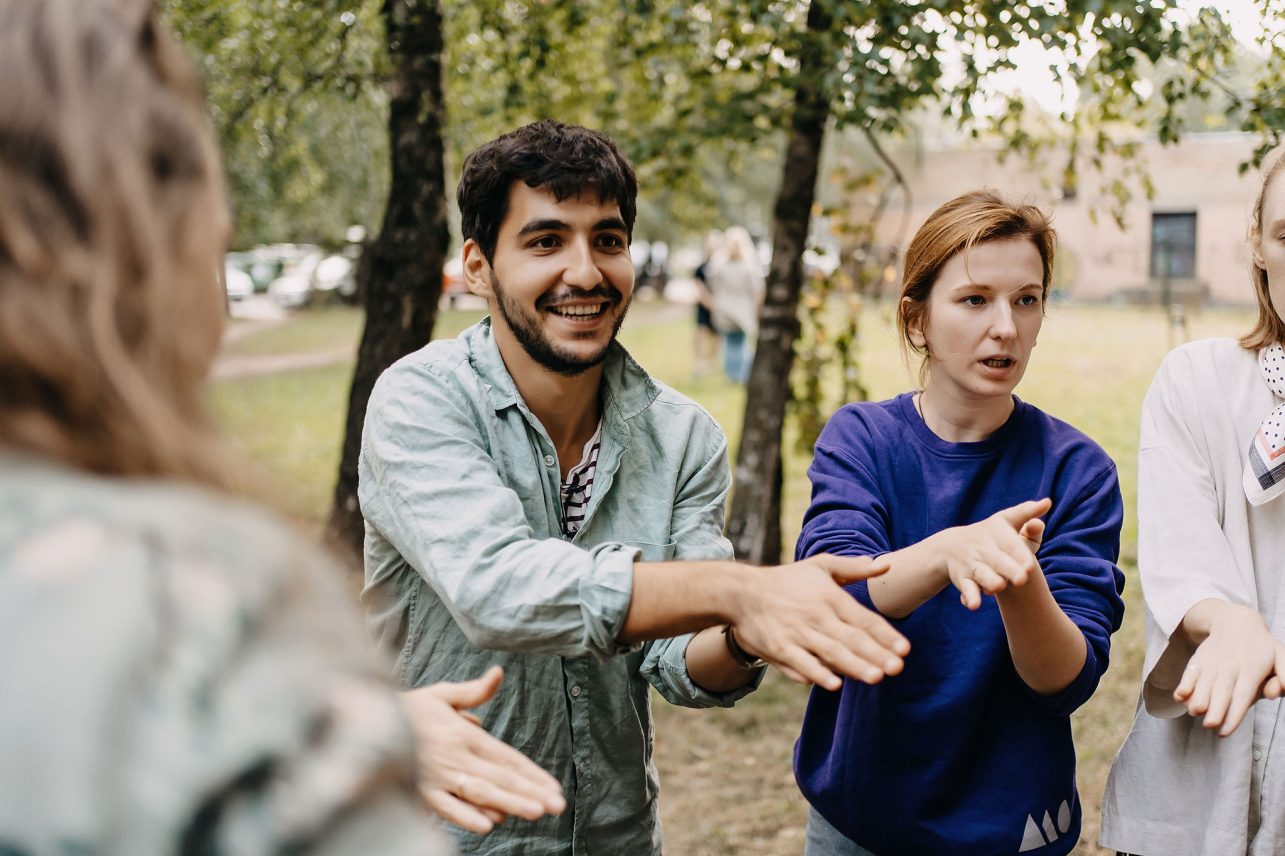
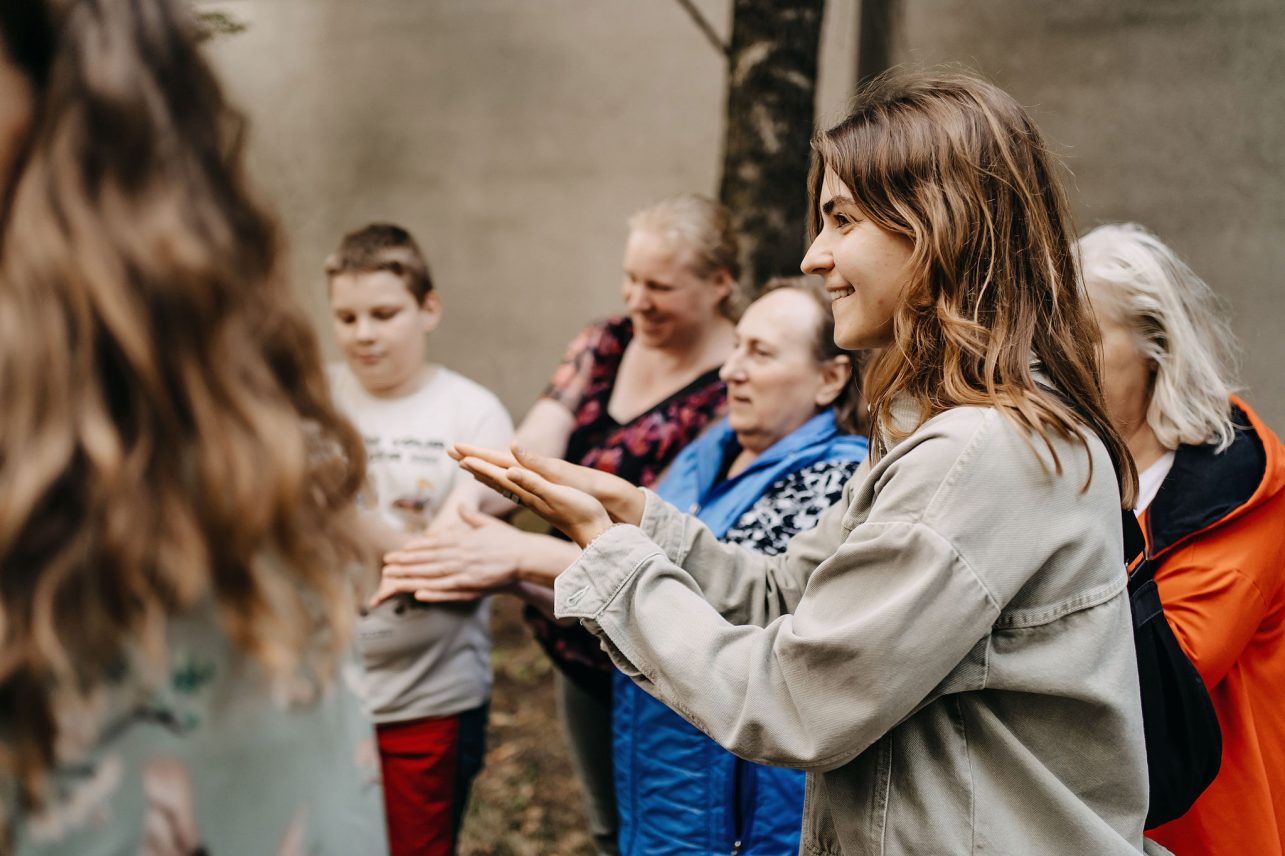
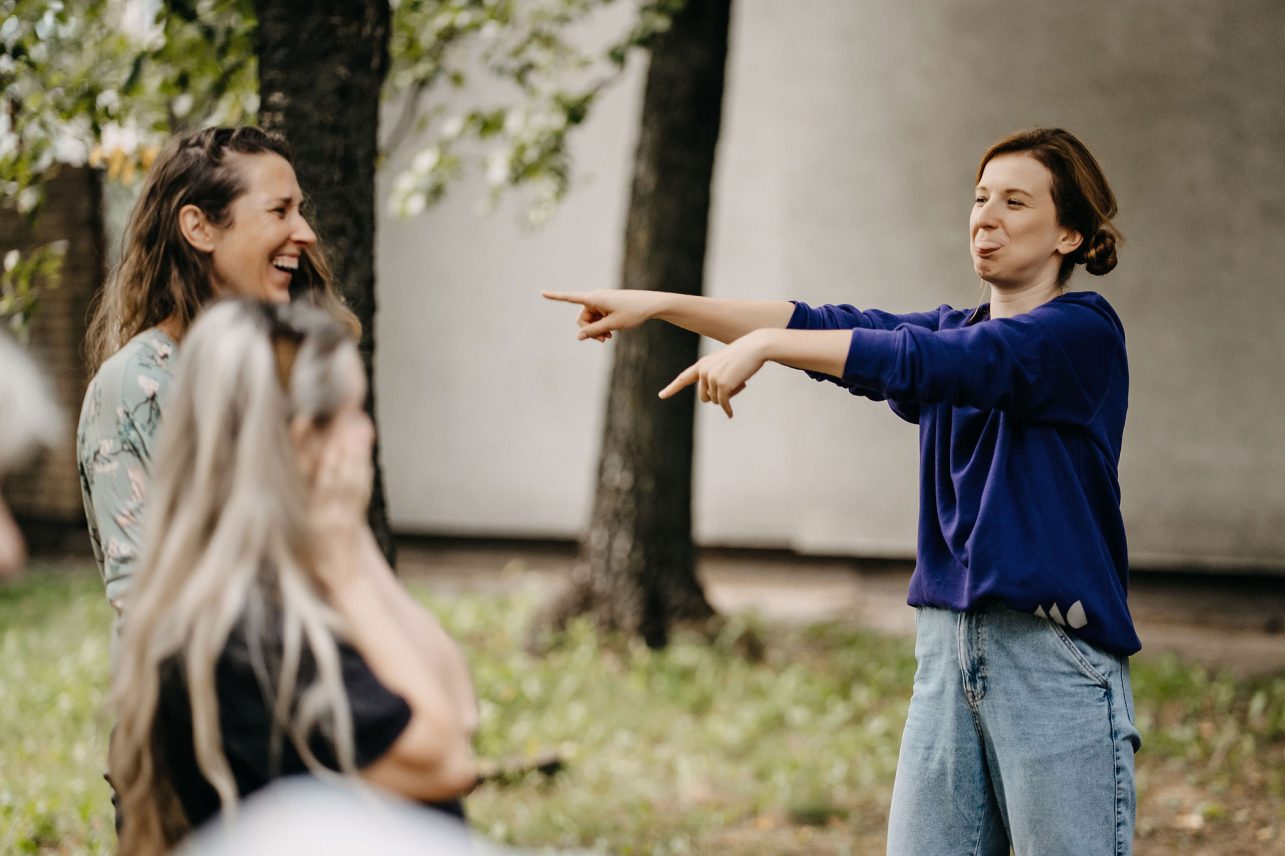
The present simplicity, openness, and lightness in the air are characteristic features of these artists’ energy. Their wealth of experience includes several years of working with different communities. Through their artistic activities, they constantly seek ways to share art and artistic tools with professionals and non-professionals alike. Barbora began her artistic journey in childhood, attending theater and other artistic after school activities, performing on big stages, and eventually choosing to study puppetry, which led her to the field of physical theater. As she shares, her search to understand what truly interests her was long. Although clowning and community-based theater currently give her the greatest sense of purpose, she is not sure if this is the final stop on her path of discovery. She recalls that clowning interested her due to its social aspect, the ability to create closer contact with people: “I started thinking more about which type of theater I wanted to do and I was sure that what I miss nowadays is to come closer to people. To do something which is reachable, accessible, not just for the high class but more for people who usually don’t have a chance to meet art.” Clowning brought into Barbora’s life not only a stronger sense of purpose in her work but also an acquaintance with Orkun, who eventually became her partner not only in her professional journey but also in her personal life.
Orkun’s experience working with communities is diverse, reaching across Europe and exploring social groups and national minorities. After the first cycle of studies, he deepened his knowledge of physical theater in Spain, later arriving in Brno, Czech Republic, where he met Barbora during further studies: “After my studies in Brno, two good things happened to me: my partner, in life and work, and one year long project with community, which is performance and movement-based production process. I think this year shaped my journey the most.” Observing them working together, one gets the feeling that their intertwining partnership in personal life and work poses no challenges. During the conversation, they assure that sometimes it is difficult, but when faced with difficulties, they look for ways to solve them, and their different qualities complement their work in their own way. Perhaps this is influenced by the fact that they both enjoy the activity they perform and strive to improve, even if it means expressing criticism to a close person. “I think both of us, we really love our job. I don’t perceive my job as a job. It’s a part of me. It’s existential. Sometimes it can be even fruitful for the relationship. I think nobody was that much honest and even sharp to me about my work. Of course, I take it more personally, so I have more difficulty digesting it, but when I do, I think the work is deeper. Our cooperation makes me dig deeper into my interests and into question what is in my opinion, the purpose of art or theater,” shares Barbora.
Although the artists work also with projects that are not necessarily related to community theater, at this stage of their creative work, the greatest attention is paid to “moving” theater off the stage. Barbora says that the joy of meeting a person and the ability to share experience means personal development for her: “I think human experience is the reason why I am here now. Meeting a person in the context of art, this is something that makes me excited. When I was performing or doing puppetry, when I was on the stage alone, people watching me, it was not so joyful compared to what I am doing now. Now I am always developing.” While working in the community, they strengthen the relationships within it. In part, this is like an exercise, teaching one to notice the other, to listen, to consider the presence of those nearby. Orkun notes that although communities may differ, what unites them is a sense of togetherness discovered through various practices: “I think it is always being in togetherness that is super strong. I can see, feel, and resonate with their understanding, the energy, the feedback, the very fact of feeling each other. They experience this joy and realization and it is so strongly present. The most precious thing is to see how they start to understand and feel that there is something more than just you.”
It is probably not surprising that this month-long residency reached the artists not by chance, but while working with a community, only this time they were in Latvia: “In this lovely residency we met Linda Krūmiņa. She’s a partner of Magic Carpets in Riga. She saw that we are really into community-based theater and she told us about the project,” recalls Barbora. This residency, as the couple notes, is unique for them because it is the first time they are sharing the subtleties of clowning with non-professionals. Another no less interesting fact is that the Dainava community had the right to vote in choosing the artists who would come and lead the creative workshops. “I consider it important to mention that the community chose us based on the video that they saw. So, there is this silent agreement and when we are preparing for the workshops, we are considering this. Usually when we are working with other communities, we are searching what they would like to do, but now, even though we are of course always reflecting on what they like, because of this little agreement, we are sometimes choosing something less comfortable for them. More challenging, to give them a chance to try. Not too much, we are not pushing the boundaries so much because we still want them to feel nice, but sometimes we are choosing the things which can be challenging,” – says the artist with a smile on her face.
And indeed, this could be felt as the workshop in Dainava progressed. During a simple but attention-demanding game, those who made mistakes had to perform a so-called “penalty,” while the rest laughed heartily. It was interesting to observe how a shadow of confusion or a glimpse of shame would appear on the face of each person who made a mistake, but the kind laughter echoing around quickly invited the one who erred to laugh along. The power and burden of shame and making mistakes can be immense and destructive if we are unable to accept it in a healthy way. Often in society, we do not know how to do this, so making mistakes becomes a terrible experience. And yet, it is human and inevitable. This simple, seemingly childish game, enabled laughter to become a tool that helps to accept one’s failure and to be able to diminish it. This is an approach rooted in clowning school, where you learn to accept the failures and with the help of laughter it becomes possible to burst the bubble of tension. “The clown itself is a challenging thing. Mostly because of the ego and our failures. We can provide different levels to investigate ego and how to approach it, how to create this clown perspective. Interesting, because it was our first question to them when we met, what needs do I have? I remember vividly one answer, which was craziness. And then playfulness, lightness, feeling released. So we are keeping these things in our pockets, all the time. And we are looking for different ways, how we can feed these needs,” says Orkun. Most likely, it goes without saying that after this game, we all returned to the space smiling and sharing a much more tangible sense of togetherness.
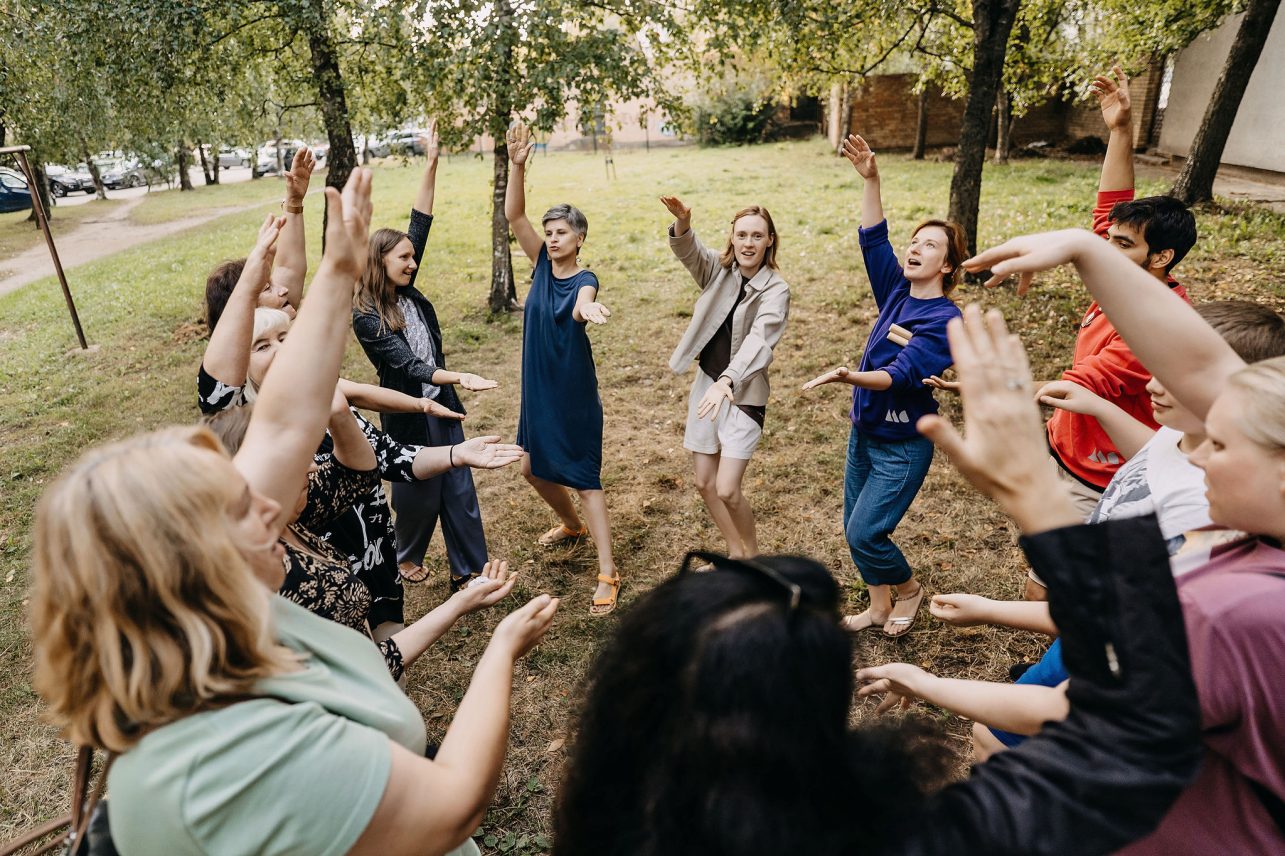
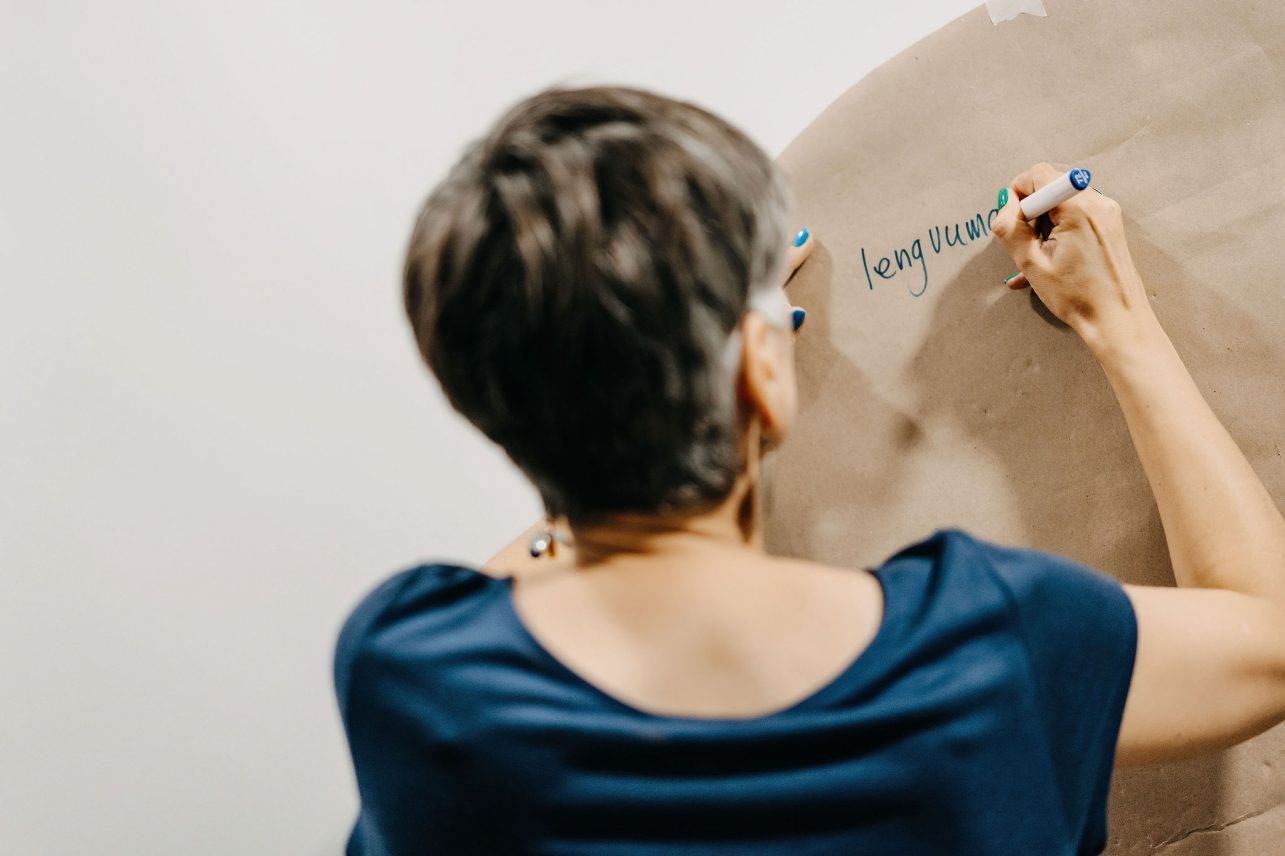
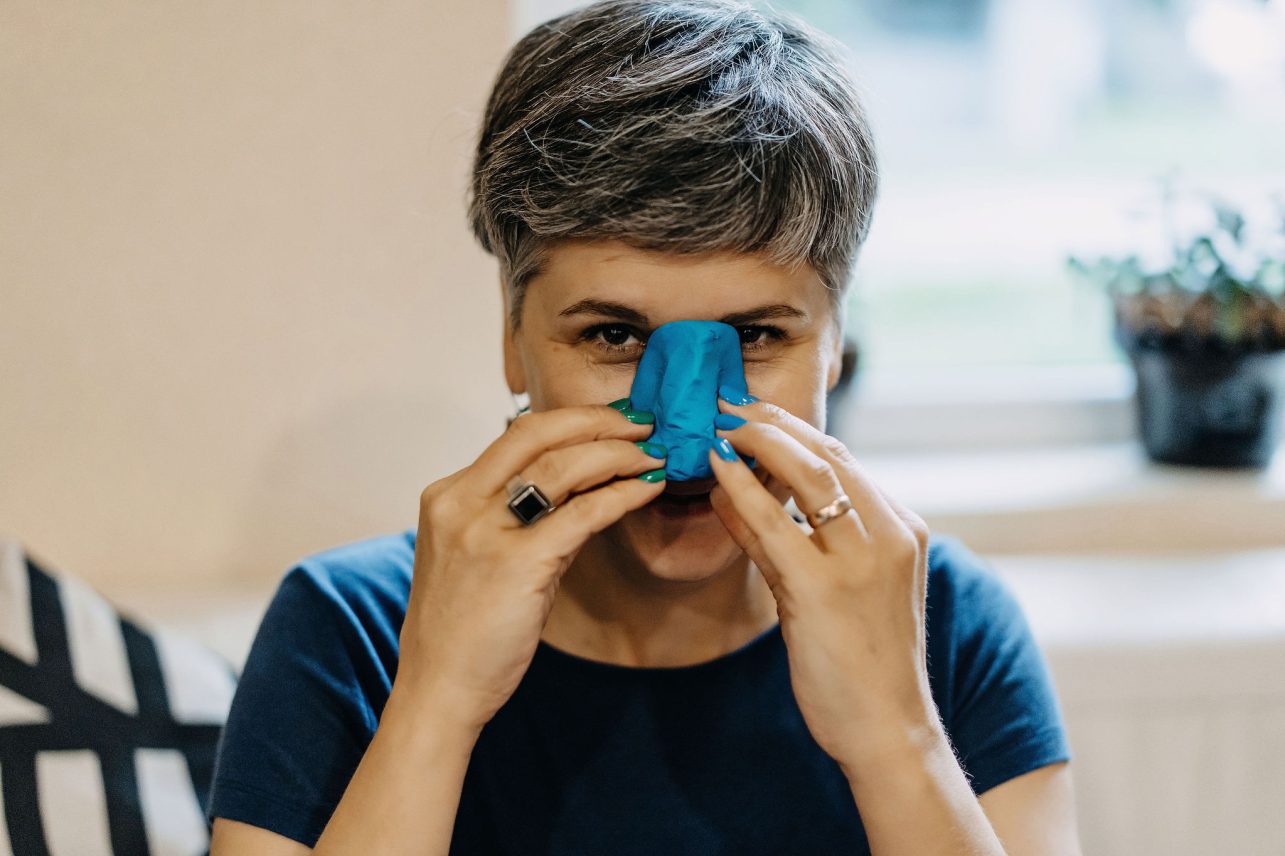
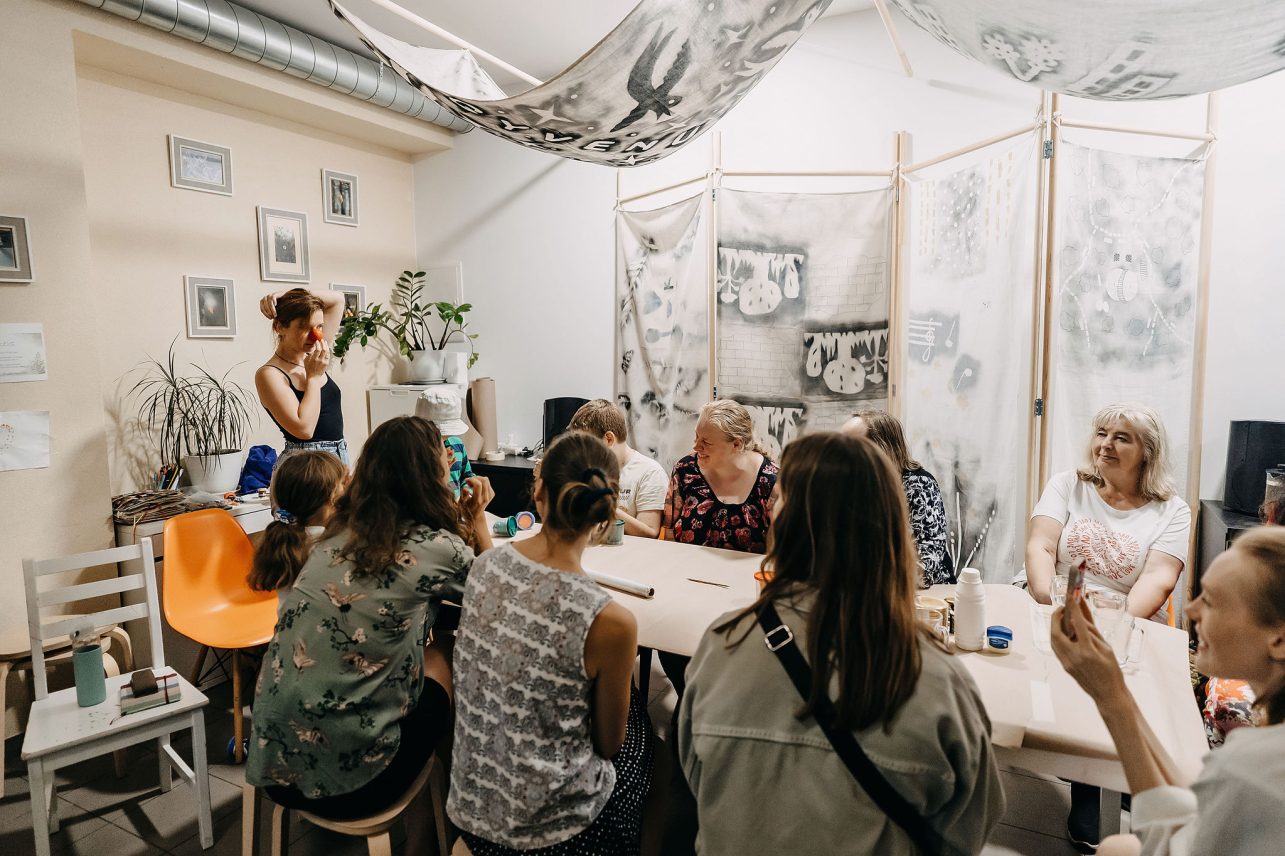
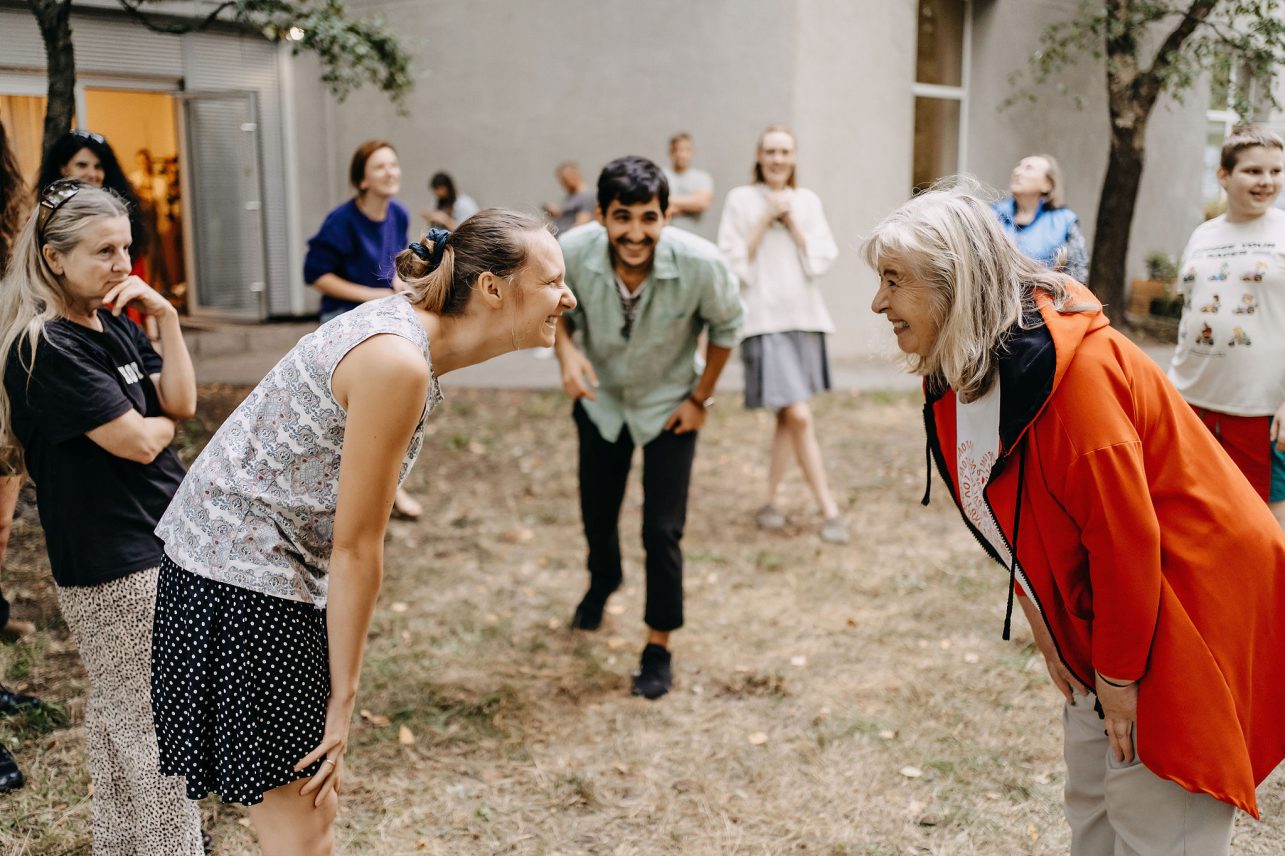
A significant part of our meeting was filled with a conversation about what contemporary clowning and physical theater mean to the artist duo. Both artists agree that definitions and terms are phenomena conditioned by society and widespread understanding, so through their work, they partly aim to educate and expand the boundaries of established perception: “I believe these names exist because of society and expectations. For example, the term physical theater, it exists, but theater in itself is physical. There is an actor with a body. So we are saying physical theater because it opens the question in the person, so one can start thinking: what is physical theater, what can it mean? In general it means that you will approach something through the body, you will think more through the body,” explains Barbora. Their chosen direction of activity does not fit into very traditional frameworks, but the description they chose, although not perfect, nevertheless helps to define it in a way that is clear to the widest possible audience. Even clowning, which may seem like a narrow field, is divided into even smaller branches, from the traditionally understood clown in a circus performance to clowns who work in hospitals. “We are not practicing the classical way of clowning, and we will not talk about just having fun. I think some people when you say clowning or clown, they still will think about a circus clown appearing in a circus. So it makes sense to mention contemporary clowning, also because both of us have education and experience in it,” says Orkun as we delve into the meanings of these terms. “I hope in future, when we say theater, the imagination of society will be not so narrow. And once we have this, I would like to call myself just a theater maker. Because of facilitating, I’m not just an actor,” he adds, and this allows one to understand the great ambition that this young artistic couple carries out in their daily work.
“The Power of Kindness” in today’s large and small-scale contexts becomes an important tool for remaining human, for compassion, for understanding each other. Kindness, on the other hand, has many faces and can be understood differently by everyone. In the case of this duo, it is softness and empathy; they both unanimously believe in the power of theater to reveal and strengthen these qualities in people: “I believe that theater, art, and clowning can really soften the way one looks at the world. Through clowning, we are learning to accept our failures, our mistakes, to see the world with a different perception. This is my aim or motto or even sense of my life nowadays to bring kindness, invite to see things more softly, with more light and open heart,” says Barbora. Meanwhile, Orkun echoes and supplements his partner’s thoughts, emphasizing the importance of empathy in today’s world: “I associate it with empathy. If one has this capability of empathy, one can be kind. This is the first step for me. I think this creates the power of kindness, power of behaving in a kind way. This is one of the reasons why I started to act and be interested in theater, too. To strengthen the sense of empathy through theater. I believe that theater has this possibility.”
After coming back to the Czech Republic, the artists will continue their work and seek ways to further strengthen community ties and provide members with tools so that kindness in its various forms expands and spreads like a virus, but in its healthiest form. “For us, it is very important to stay transparent. To work in a way that when you leave, the community members don’t feel that they lost something. So they are building something with our help, but between each other, and when we leave, they carry it, it stays with them,” Barbora’s words resound, and it finally helps to understand what exactly is the power they are creating. It is the empowerment of the community to act together, understanding that everything that creates kindness – softness, empathy or anything else – is already within them; they just need to continuously cultivate it through their shared work and efforts.
“Magic Carpets” project “The Power of Kindness” CLOSING EVENT
9th of October, 6:00 pm
The Family Center “Let’s Be Together” (Būkime kartu) (V. Krėvės Ave. 49, Kaunas)
The event is part of the Kaunas Biennial project Magic Carpets. The project is co-funded by the EU Creative Europe Programme and Lithuanian Culture Institute.

